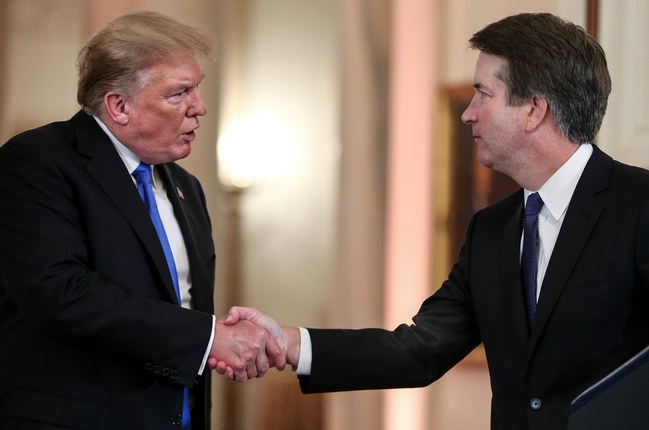Judge Brett Kavanaugh: A Supreme Pick
Last week, President Trump announced D.C. Appeals Court Circuit Judge Brett Kavanaugh as his pick to join the Supremes. A former aide to President George W. Bush, Kavanaugh is known as an originalist when it comes to interpretation of the Constitution, believing the Constitution should be interpreted exactly how it was written.
Judge Kavanaugh spent time clerking under Justice Anthony and is best known for his work with the counsel that led to President Clinton’s impeachment in the House. Since that time, Kavanaugh has expressed a change in his stance on indicting a sitting president. In a law-review article published by Kavanaugh in 2009, he explained that Presidents should not only be free from the possibility of indictment while in office but should also be allowed to avoid questioning from law-enforcement officials. Kavanaugh went on to stated Congress should “consider a law exempting a president—while in office—from criminal prosecution and investigation, including from questioning by criminal prosecutors or defense counsel.”
While the true motives behind Trump’s pick of Kavanaugh will never be known, we’re doubling down on the above commentary being a strong factor in the president’s pick. As such, Democrats are crying foul and looking for every reason to drag out Kavanaugh’s confirmation.
For the most part, confirmation hearings bring little fanfare, but with midterm elections right around the corner, the road to confirmation could be riddled with speed bumps. The GOP is hoping for a quick confirmation in order to humblebrag to their base, but on the other side of the aisle, Democrats are not fully convinced Kavanaugh is the best choice. Instead, they are hoping to take back Congress in November and tell Kavanaugh “you can’t sit with SCOTUS.”
Since being nominated, there has been no shortage of speculation on Kavanaugh’s political worldview and the kind of justice he will be once he dons his new robe. In an effort to project where Justice Kavanuagh will fall on the political spectrum on the Court, political scientists have used votes, hiring decisions, political donations, the text of rulings, and the language used to talk about him to make a prediction.
In the study “How Conservative Will President Trump’s Next Supreme Court Nominee Be?” by Associate Professor of Law at Mercer University School of Law, Jeremy Kidd, he examines three potential SCOTUS nominees, including Judge Brett Kavanaugh. Kidd’s findings are based on Martin-Quinn scores which measures judicial ideology based on voting patterns as well as Clerk-Based Martin-Quinn Scores. The Clerk-Based Martin Quinn Score looks at the ideology of the Supreme Court Justices for whom a lower court judge’s clerks worked for. Based on predictions of Martin-Quinn and Clerk-Based Martin-Quinn Scores, Judge Kavanaugh would be the most liberal justice put on the Supreme Court by a Republican president since Justice Stevens.
Currently, the Supremes lean a little to the right, and some believe Kavanaugh would tip the bench fully to the right. However, Kidd’s report explains judges with prior DC court experience makes them more likely to vote consistently along ideological lines of the president who appointed them.
As a 12-year veteran on the Appeals Court for the District of Columbia Circuit, and an alum of George W’s administration, there is no question Kavanaugh is a D.C. establishment appointment. He has a history of ruling against (most) government regulation and favors expansion of gun rights under the Second Amendment. There is no question Kavanaugh has been the poster child of conservatism on the bench, but there lies the potential for Kavanaugh to be more liberal after his first year as a justice. Based on Kidd’s empirical data and research, Republican-appointed justices tend to become more liberal the longer they sit on the Court.
Since Kavanaugh is Trump’s second appointment in his first term, Democrats are becoming increasingly worried about the Court’s stance on social issues, especially abortion. While Kavanaugh has never taken a strong stance one way or another on the issue of abortion, he has come under fire for being too liberal and too conservative in regards to his abortion rulings.
Regardless of the president doing the appointing or the judge being appointed, Supreme Court nominations are kind of a big deal. Aside from being a lifetime appointment, each decision rendered by SCOTUS leaves a mark in American history, and will affect Americans for decades to come.
It is safe to say, the upcoming confirmation hearings will have Democrats cringing over the possibility of a conservative court, and Republicans daydreaming about court cases being decided in their favor. But the reality is, until Kavanaugh takes the bench and gets a few rulings under his belt, no one will truly know the type of justice he will be or if the Supremes will become more conservative.
The one thing we do know for certain is, given the current state of affairs, Kavanaugh’s confirmation is likely to strengthen the Court’s support for the Constitution’s separation of powers and is something that should be welcomed by both parties.

